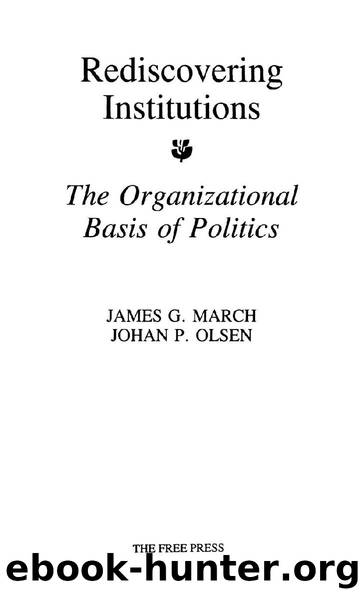Rediscovering Institutions by JAMES G. MARCH & JOHAN P. OLSEN

Author:JAMES G. MARCH & JOHAN P. OLSEN
Language: eng
Format: epub
Publisher: THE FREE PRESS
Published: 1989-07-15T00:00:00+00:00
INSTITUTIONAL REFORM AS CONSTITUTIONAL CHANGE
Lurking behind the institutional frictions we have identified above is a grander issue of constitutionalism. When the apparently mundane and nonpolitical concerns of administrative efficiency become central concerns of the political process, the polity is likely to be led to issues of the constitutional principles upon which the political organization of society should be based, and thus of the moral dilemmas of democratic governance. By constitutional principles we mean those aspects of a polity that are generally viewed as not subject to routine political determination through various forms of majority rule.
The proper balance between majority rule and constitutional principles is an ancient, and perpetually controversial, one (Walzer, 1983; Slagstad, 1987). Democratic ideology assumes that elected leaders may design or choose the institutional forms so that they contribute to the achievement of political goals in the most effective and efficient way. Developing political institutions that reflect popular sovereignty is seen as a first-order political process and the struggle over institutional forms is at the heart of politics (Wheeler, 1968). The winners of the political competition have the authority and power to mold political institutions. When the focus is on constitutional principles, however, democratic ideology emphasizes the constraints placed by constitutional rules and established institutions on deliberate institutional design and choice.
Different polities define different things as being part of what is “taken as given,” and the distinction between “constitutional” issues and those that are not is often elusive. Most political systems make more refined distinctions than the dichotomy permits. Nevertheless, it is clear that the comprehensive reform of political institutions is often classified as being toward the constitutional end of the scale, and so requires something closer to consensus than do other kinds of political actions. Such a program affects the political order regulating the exercise of public authority and power. A change in this order may alter the values of the state, the purpose and meaning of state actions, the rationale and legitimacy of institutional boundaries, the regulation of conflict, and the conditions under which different interests may be pursued (Poggi, 1978: 97; Dyson, 1980: 206).
From such a perspective, changes in administrative structure or procedures can be seen as challenging elements of the core system of meaning, belief, interpretation, status, power, and alliances in politics (Goodman and Kurke, 1982). Institutional reform involves issues of the proper role of the state and politics in society, the ethical base and legitimacy of government, and the appropriate priorities for the public agenda. In a modern era of administrative institutions, therefore, we should not be surprised if comprehensive administrative reorganization is treated by some political systems as a fundamental change for which substantial consensus is required. In an increasingly administrative structure of governance, however, such a treatment places much of the apparatus of effective popular control beyond the reach of elected officials.
The constitutional history of Western democracies varies from country to country, but the transformation of many countries from liberal-democratic states with modest public agendas to welfare states created a model of constitutional governance that can be described as a corporate-bargaining state.
Download
This site does not store any files on its server. We only index and link to content provided by other sites. Please contact the content providers to delete copyright contents if any and email us, we'll remove relevant links or contents immediately.
The Secret History by Donna Tartt(19012)
The Social Justice Warrior Handbook by Lisa De Pasquale(12179)
Thirteen Reasons Why by Jay Asher(8878)
This Is How You Lose Her by Junot Diaz(6866)
Weapons of Math Destruction by Cathy O'Neil(6254)
Zero to One by Peter Thiel(5778)
Beartown by Fredrik Backman(5723)
The Myth of the Strong Leader by Archie Brown(5488)
The Fire Next Time by James Baldwin(5421)
How Democracies Die by Steven Levitsky & Daniel Ziblatt(5207)
Promise Me, Dad by Joe Biden(5138)
Stone's Rules by Roger Stone(5072)
A Higher Loyalty: Truth, Lies, and Leadership by James Comey(4942)
100 Deadly Skills by Clint Emerson(4908)
Rise and Kill First by Ronen Bergman(4766)
Secrecy World by Jake Bernstein(4735)
The David Icke Guide to the Global Conspiracy (and how to end it) by David Icke(4693)
The Farm by Tom Rob Smith(4496)
The Doomsday Machine by Daniel Ellsberg(4477)
